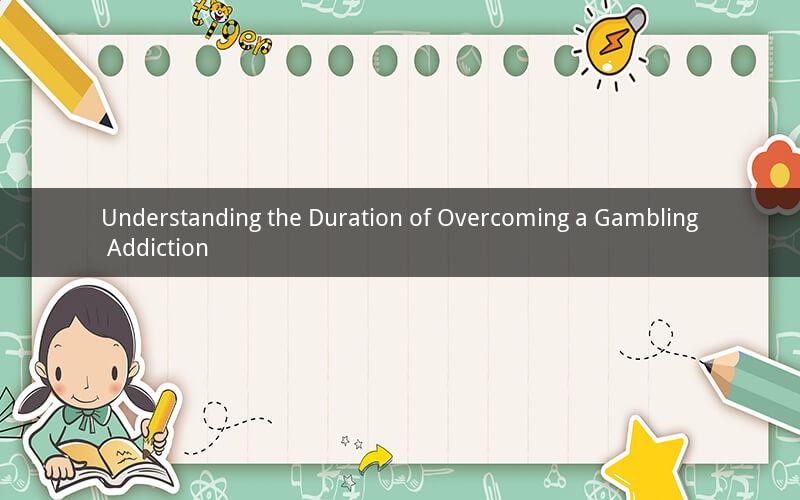
Introduction:
Gambling addiction is a complex issue that affects millions of individuals worldwide. It is a disorder characterized by the inability to control gambling behavior, leading to significant harm in various aspects of life. One of the most common questions asked by those struggling with gambling addiction is, "How long does it take to break a gambling addiction?" This article aims to explore the factors influencing the duration of overcoming a gambling addiction, the stages involved in recovery, and strategies to support the journey towards a healthier lifestyle.
Factors Influencing the Duration of Recovery:
1. Severity of the addiction:
The severity of the gambling addiction plays a crucial role in determining the duration of recovery. Those with a mild addiction may recover faster than those with a severe addiction. The severity is often assessed based on the frequency, amount, and consequences of gambling behavior.
2. Personal motivation:
The level of motivation to overcome the addiction significantly impacts the recovery process. Individuals who are highly motivated to change their gambling habits are more likely to achieve long-term recovery. Motivation can stem from personal reasons, such as wanting to improve one's financial situation or restore relationships.
3. Support system:
Having a strong support system is vital for overcoming a gambling addiction. Friends, family, or support groups can provide emotional support, encouragement, and practical advice throughout the recovery journey. The presence of a supportive network can accelerate the recovery process.
4. Access to treatment:
Availability and accessibility to effective treatment options can influence the duration of recovery. Treatment approaches may include therapy, counseling, medication, or a combination of these. Access to treatment resources can vary depending on geographical location and availability.
5. Coping skills:
Developing healthy coping skills is essential for managing triggers and cravings during recovery. Individuals who possess strong coping skills are more likely to maintain long-term sobriety. Coping skills can be learned through therapy, self-help books, or support groups.
Stages of Recovery:
1. Denial and resistance:
The initial stage involves denial and resistance to acknowledging the existence of a gambling addiction. Individuals may downplay their problem or refuse to seek help. Breaking through this stage requires understanding the consequences of gambling addiction and recognizing the need for change.
2. Acceptance and commitment:
Once the individual acknowledges the addiction, they move towards acceptance and commitment to change. This stage involves making a conscious decision to seek help and take responsibility for their actions. It is crucial to surround oneself with a supportive network during this stage.
3. Treatment and therapy:
During this stage, individuals engage in various treatment approaches, such as therapy, counseling, or support groups. Treatment helps address underlying issues contributing to the addiction and provides tools to manage cravings and triggers. Therapy may include cognitive-behavioral therapy (CBT), dialectical behavior therapy (DBT), or motivational interviewing.
4. Relapse prevention:
Relapse is a common challenge in recovery. This stage focuses on identifying potential triggers and developing strategies to prevent relapse. Relapse prevention techniques may include setting boundaries, creating a relapse prevention plan, and practicing self-care.
5. Maintenance and long-term recovery:
Once the individual has achieved a period of sustained sobriety, they enter the maintenance phase. This stage involves ongoing efforts to maintain recovery and prevent relapse. It requires continued self-reflection, personal growth, and engagement in healthy activities.
Strategies for Support and Recovery:
1. Seek professional help:
Consulting with a mental health professional or addiction specialist can provide personalized guidance and support throughout the recovery process. Therapy and counseling can help address underlying issues and develop coping skills.
2. Join a support group:
Support groups, such as Gamblers Anonymous or Gam-Anon, offer a community of individuals experiencing similar challenges. Sharing experiences, receiving encouragement, and learning from others' journeys can be incredibly beneficial.
3. Develop a relapse prevention plan:
Identify potential triggers and develop strategies to cope with them. This plan may include avoiding high-risk situations, creating a support network, and practicing relaxation techniques.
4. Engage in healthy activities:
Engaging in activities that promote well-being, such as exercise, hobbies, or socializing, can help reduce the urge to gamble. Find activities that bring joy and fulfillment.
5. Practice self-care:
Prioritize self-care by ensuring adequate sleep, maintaining a balanced diet, and managing stress. Self-care is crucial for maintaining physical and mental well-being during the recovery process.
FAQs:
1. How long does it take to break a gambling addiction?
The duration of recovery varies for each individual. Some may experience significant improvement within a few months, while others may require years of ongoing efforts.
2. Can gambling addiction be cured?
While there is no quick fix, gambling addiction can be effectively managed and overcome with the right support and treatment.
3. Will therapy help with overcoming a gambling addiction?
Yes, therapy can be incredibly beneficial in overcoming a gambling addiction. It helps individuals address underlying issues, develop coping skills, and create a personalized recovery plan.
4. Can medication help with gambling addiction?
Medication can be prescribed in some cases to help manage cravings and reduce the urge to gamble. However, it is often used in conjunction with therapy and other treatment approaches.
5. How can I support a loved one struggling with a gambling addiction?
Be supportive, patient, and understanding. Encourage them to seek help, offer to accompany them to therapy or support groups, and be there for them during challenging times.